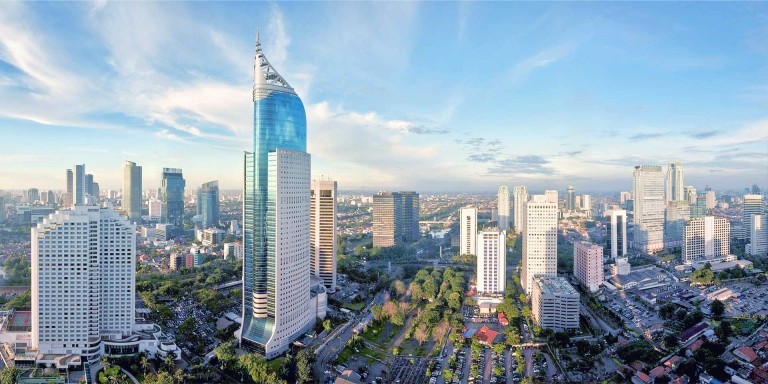What is an employer of record?
An employer of record (EOR) is a third-party organization that hires talent on behalf of another company. In Indonesia, an EOR handles employment contracts, payroll, taxes, and compliance—giving businesses the freedom to manage day-to-day work while supported employees enjoy a seamless, compliant experience.
Velocity Global’s Employer of Record (EOR) solution allows companies to hire, pay, and support talent in Indonesia without setting up a local entity. From onboarding developers in Jakarta to managing remote teams in Surabaya, Velocity Global acts as the legal employer and handles every detail. Its Global Work Platform™ offers a centralized hub to onboard, manage, and pay talent—backed by local expertise at every step.
Employment Guide to Hiring in Indonesia
Explore the topics below to learn everything you need to know about hiring employees in Indonesia.
Hiring in Indonesia: employment guide
Employee agreements
Indonesian law requires written employment agreements for all permanent and fixed-term employees. These agreements must include job responsibilities, compensation details, benefits, and termination clauses. Contracts must be written in Bahasa Indonesia to be enforceable.
Probationary periods
Employers can apply for a probation period of up to three months for permanent employees. Note that fixed-term employees cannot be placed on probation.
Average working hours
The standard workweek is 40 hours. Employees may work eight hours across five days or seven hours across six days. Overtime pay is mandated by law and varies depending on hours worked.
How an EOR helps employers hire in Indonesia
Velocity Global helps businesses hire faster by handling employment contracts, onboarding, and compliance. Our experts manage local employment laws, so customers avoid delays and legal headaches.
Get expert help with hiring in Indonesia
We're ready to guide you with global hiring, payroll, benefits, international workforce compliance, plus pricing information.

Payroll in Indonesia
Payroll cycles
Most companies pay employees monthly, typically on the last working day. Different schedules can be agreed upon in contracts.
Wages
Minimum wage rates vary by region. In 2025, Jakarta's minimum monthly wage is IDR5,067,381 (around US$325), according to the Indonesian Ministry of Manpower.
Bonus payments
A religious holiday bonus, THR, is mandatory and equals one month’s salary. It must be paid at least one week before a major religious holiday.
How an EOR helps run payroll
Velocity Global handles everything from salary calculations to tax withholdings and statutory bonuses. Our Global Work Platform lets companies stay audit-ready and in control of payroll without the manual lift.
Taxes in Indonesia
Tax due dates
Employers must remit income tax monthly. Individual tax returns are due annually by March 31.
Tax thresholds
Indonesia uses a progressive tax system:
- 5%: Up to IDR60 million
- 15%: IDR60 million–250 million
- 25%: IDR250 million–500 million
- 30%: IDR500 million–5 billion
- 35%: Over IDR5 billion
Health insurance
All employees must be enrolled in Indonesia’s BPJS Kesehatan health insurance program. Both employer and employee share contributions.
Pensions
BPJS Ketenagakerjaan covers retirement and occupational insurance:
- Employer: 3.7% of gross salary
- Employee: 2% of gross salary
How an EOR helps manage taxes
Velocity Global ensures full compliance with tax and social security requirements. We handle BPJS enrollment, keep up with evolving regulations, and eliminate the risk of costly mistakes.
Calculate payroll contributions in Indonesia
Leave entitlements in Indonesia
Annual leave
Employees receive 12 days of paid annual leave after one year of service. Employers may offer more generous leave policies.
Parental leave
- Maternity leave: three months (six weeks before and after birth)
- Paternity leave: two days
Sick leave
Paid sick leave is granted with a medical certificate. Employees receive 100% pay for the first four months, then decreasing percentages.
Public holidays
Indonesia observes 16–20 public holidays annually, including religious and national holidays like Eid al-Fitr, Christmas, and Independence Day.
How an EOR helps manage leave
Velocity Global tracks and administers all leave types. Customers stay compliant while supported employees get accurate, timely benefits.
We’re here to help you hire in Indonesia
Get expert guidance with global hiring, payroll, benefits, and compliance.

Employee benefits in Indonesia
Statutory benefits
Employers must provide health insurance, pension coverage, paid leave, and accident insurance.
Supplemental benefits
Many companies offer extra perks like:
- Private healthcare
- Meal and transport allowances
- Internet or mobile reimbursements
- Wellness or learning stipends
How an EOR supports benefits administration
Velocity Global makes benefits easy. We manage both statutory and supplemental perks, so supported employees feel valued and businesses stay competitive.
Processing terminations in Indonesia
Notice periods
Permanent employees must receive 30 days' notice. Employers must often secure labor court approval unless both parties agree to terminate.
Severance pay
Termination entitlements vary by reason and tenure:
- Severance: 1–9 months of salary
- Long-service pay: 2–10 months (based on years worked)
- Compensation pay: Covers unused leave, relocation, etc.
How an EOR helps manage terminations
Velocity Global ensures compliant, respectful offboarding. We navigate court approval processes and calculate entitlements accurately.
-
Can companies hire in Indonesia without setting up a local entity?
Yes. An EOR allows companies to legally employ talent without establishing a legal entity.
-
What types of companies use EOR solutions in Indonesia?
Tech, finance, education, and manufacturing firms commonly use EORs to hire in Indonesia.
-
How fast is onboarding with an EOR in Indonesia?
Most supported employees can start within a few days, pending documentation.
-
Can an EOR support remote work in Indonesia?
Yes. Velocity Global supports both in-office and remote employees across the country.
-
Is an EOR a cost-effective solution in Indonesia?
Absolutely. It reduces legal setup costs, minimizes risk, and accelerates hiring.



